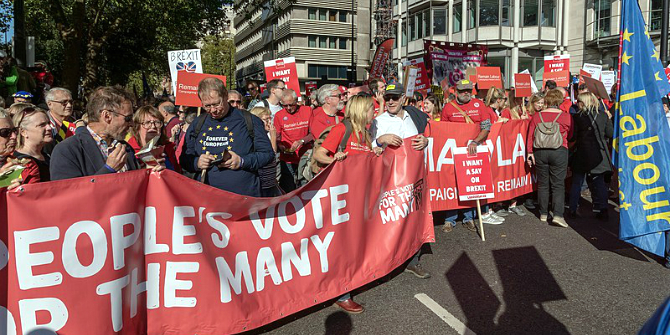 Even if No Deal doesn’t happen, there will be years and years of rows with the EU and political divisions in the UK. Denis MacShane argues that the briefest of readings of the Political Declaration attached to the UK-EU deal reveals that an eternity of difficult, tetchy negotiations lies ahead as the UK and EU try and fashion a new modus vivendi. Brexeternity is the UK’s future.
Even if No Deal doesn’t happen, there will be years and years of rows with the EU and political divisions in the UK. Denis MacShane argues that the briefest of readings of the Political Declaration attached to the UK-EU deal reveals that an eternity of difficult, tetchy negotiations lies ahead as the UK and EU try and fashion a new modus vivendi. Brexeternity is the UK’s future.
Has any MP actually read the 147 paragraphs in the Political Declaration part of the UK-EU deal which outline the headings of what has to be negotiated between the EU and the UK if the Commons agrees to accept Mrs May’s deal?
The briefest of reading reveal a Brexeternity of difficult, tetchy negotiations lies ahead as the UK and EU try and fashion a new modus vivendi. On almost every page can be seen future quarrels, the injection into the negotiations of special producer interests or NGOs demanding their demands are respected. The likelihood for big disagreements in the House of Commons as MPs have the pleasure of demanding that everything they dislike about Europe is now put into a final Treaty before it is ratified.
Take for example the fourth of 147 paragraphs in the Political Declaration which set out the heads of negotiation.“The future relationship will be based on the integrity of the Single Market and the Customs Union and the indivisibility of the four freedoms” while simultaneously it commits to “the ending of free movement of people” between the UK and Europe and vice versa. Where is the negotiating guru who who can reconcile upholding and ending free movement in the same agreement?
Then it is agreed the UK will participate in EU programmes on “science and innovation, youth, culture and education, overseas development and external action, defence capabilities, civil protection and space. These should include a fair and appropriate financial contribution.” Hang on. The point of Brexit was to stop paying huge amount of British taxpayers’ money to the EU. This suggests the opposite as well as joining EU defence programmes which many in the pro-Brexit camp oppose. Paragraph 15 states: “The Parties note the United Kingdom’s intention to explore options for a future relationship with the European Investment Bank Group. The EIB has been investing up to £5bn a year in the UK – from Crossrail to new schools in Yorkshire – which will now end. Membership of the EIB is based on EU membership and negotiating any new participation will only be possible at the end of the tortuous negotiations going into the 2020s.

Image by Marco Verch, (CC BY 2.0).
Another contradiction can be found in paragraph 17. “The Parties agree to develop an ambitious economic partnership. respecting the integrity of the Union’s Single Market and the Customs Union’ while “recognising the development of an independent trade policy by the United Kingdom beyond this economic partnership.” Perhaps there are undiscovered geniuses in Whitehall who can negotiate a final EU-UK trade relationship that can square the circle of the Single Market and Customs Union and the UK cutting its own trade deals but so far he or she has not surfaced.
On financial services: “the Parties agree cooperation should include transparency and appropriate consultation in the process of adoption, suspension and withdrawal of equivalence decisions, information exchange and consultation on regulatory initiatives.” This is blah-blah and will amuse the EU negotiators in Switzerland. The Swiss have been locked in negotiations since 1993 to try and get access for their financial services sectors in Zurich and Geneva to the EU market. London will be lucky to conclude a deal on services much before 2050.
Paragraph 41 says the UK and EU will aim “for fair and equal access to public telecommunication networks and services to each other’s services” yet already mobile phone providers in Britain have warned they will re-introduce data roaming charges on 30th March once the UK no longer has to obey EU rules. A key claim by Mrs May and Brexit enthusiasts is that the UK escapes from the Court of Justice of the EU, – the ECJ in English jargon. But paragraph 138 says that in case of disagreements the UK and EU will “decide the dispute in accordance with the ruling given by the CJEU’. This is not what the Brexit camp and Mrs May herself have promised.
Paragraph 48 notes “the UK’s intention to accede to the WTO Government Procurement Agreement (GPA), the Parties should provide for mutual opportunities in the Parties’ respective public procurement markets beyond their commitments under the GPA in areas of mutual interest, without prejudice to their domestic rules to protect their essential security interests.” This is close to meaningless. The idea that the WTO has opened up public procurement to open tender competition is fanciful. This means the end of British firms seeking to obtain contracts across EU27 on basis of open public tender without state protection. The moment the Political Declaration sinks back into praying in aid the WTO as a replacement for the Single Market there is little point in trying to put a number of years on negotiating time that will be needed.
Paragraph 62 states that “the Parties should ensure comparable market access for freight and passenger road transport operators, underpinned by appropriate and relevant consumer protection requirements and social standards for international road transport, and obligations deriving from international agreements in the field of road transport.” To put it mildly the laws, directives, and regulations governing vehicle movement across Europe constitute one of the biggest elements in breaking down barriers between nations. 10,000 lorries enter the UK through Dover every day. The UK leaving this framework will require either a full and comprehensive acceptance of EU rules including full freedom of movement for truckers and other vehicles entering or leaving the UK with goods or people or endless years of negotiations. In NAFTA for example, Mexican truckers still have to off-load Corona beer at the US-Mexican border despite the FTA as US truckers insist that only Americans can drive lorries in the US and have Congressional backing for this protectionism. So to maintain the current open border and liberal FoM practices for road haulage will require 5 years of negotiation and in the end, will only work if the UK accepts EU rules and law.
Overcoming these and many other contradictions in what is little better than a wish-list of headings for a future EU-UK partnership will take many years. The free trade agreement between Canada and EU was first proposed 22 years before it was signed and took seven years to negotiate. It does not cover services or the rights of Canadians to live freely in Europe or EU citizens to work or retire in Canada. The Japan-EU agreement took six years to negotiate and is limited largely to goods. Any UK-EU negotiations will face immense pressure from domestic producer and NGO lobbies in Britain and 27 EU member states – from animal rights groups to sectoral protectionists.
The next two general elections in Britain will be dominated by all political parties including those wanting an independent Scotland or united Ireland having to adopt Brexit related policies in their manifesto offers to voters. In short, far from 29th March being the beginning of the end of Brexit it is not even the end of the beginning of a decade of disputes and political rows. Brexeternity now is the UK’s future.
This post represents the views of the author and not those of the Brexit blog, nor the LSE.
Denis MacShane is the former Minister of Europe. In January 2015 his book Brexit: How Britain Will leave Europe (IB Tauris) predicted the outcome of the referendum in June 2016.







“Brexeternity now is the UK’s future.” Time to emigrate to Australia, folks! But actually, I don’t see most of these issues eating up political bandwidth the way Brexit does now. Xou can’t really imagine an election campaign taking as its main theme contributions to Erasmus or regulations for freight transport in the Channel Tunnel. Thank heavens for civil servants.
The main reason given by Leave voters to Lord Ashcroft was that they wanted to stop free movement of people. So the fact that the agreement is both for and against free movement of people is quite tricky and certainly something that can’t be left to civil servants.
Hi Andrew,
sure, there are some big issues which politicians will have to decide. But I think the right of the UK to limit free movement from the EU to the UK after Brexit is so important to a large section of the electorate that I can’t see the major parties being prepared to sacrifice it in the next few years, unless Brexit is such a disaster that the UK is prepared to do almost anything to rejoin the club, or unless the decision is made to revoke Article 50 in a referendum.
But I think a lot of the points made by Denis MacShane are about the numerous technical issues that will have to be sorted out in the next few years, which don’t interest the majority of voters. They may still be important, Erasmus and regulations of freight in the Channel Tunnel are important to those involved, but one feels that it should be possible to reach agreement without great political debate. I guess that any pair of countries which have much to do with each other have a large number of agreements which regulate issues which are below the political radar.
The issue is that a lot of people in the UK have come to an almost “End of History” belief that once Brexit is done, deal or no deal, the country can finally and permanently move on from the debate over the EU and the public will never have to hear the “B” word again.
The reality, as MacShane points out, that all this drama over the Withdrawal Agreement and the backstopmis taking place during what is supposed to be the most simple and straightforward stage of the Brexit process. The actual transition and trade negotiation are promising to be much more difficult as groups from within both the UK and the EU27 state their own demands.
Furthermore, most trade analysts believe it unlikely the UK will have a trade deal ready to implement by the end of the two-year transition period. Meaning they will be facing another cliff edge unless May or whoever is in charge requests a lengthy transition extension, that will come with an expensive price tag (Money, Gibraltar, fishing, etc).
Finally, the majority of government energy, manpower and resources are going to be focused primarily on Brexit restructuring and trade negotiations. Meaning pertinent domestic issues like the NHS and housing will be neglected and sent to the back of a very long and slow moving queue. Which will further stretch British patience and tolerance to the breaking point.
The trade negotiations may not have the same intensity as the referendum and the withdrawal agreement, but they will still permeate the political zeitgeist in ways the British people cannot ignore.
Brilliant blog, Denis. It never ceases to amaze me that people can continue to have an opinion about how things should or will be done without having any specific knowledge about these things. Brexit is the perfect example of this.
Any kind of brexit, including a no-deal brexit, will take decades to implement. By then, I’ll be long gone and so will Nigel Farage, Boris Johnson, Theresa May, uncle Tom Cobley and all annd a new generation will be left to sift through the wreckage trying to salvage bits that might be usable in the ew order.
The perfect encapsulation of the destructive ignorance that has driven Brexit is the closing of The European Medicines Agency’s London HQ to relocate in Amsterdam, taking with it 900 skilled and highly skilled jobs, 100s of millions in ancillary income and the natural location of pharmaceutical companies in the UK. We may still not leave the EU, but all that has gone for good and is not coming back.
Only a profoundly ignorant society could have let this happen, our society actively sought it.
I must concur with the two previous posts, an excellent appraisal of what is going to happen. The points made show the naivety of both those voting for Brexit and, almost unbelievably, those involved in writing up the actual agreement, politicians (and one expects their ignorance) and advisors, including those in the Civil Service (who should have argued against, and perhaps they did, the stupidity of the wording of the actual documents).
Much of what is, as you say, written in the Political Declaration is contradictory, and, as it is written, irreconcilable. OK, there will be debate, concessions on both sides, and compromise, and perhaps your time frames might be questioned, but do those who voted for Brexit, or against it, have any idea of what is really involved with moving to a new trade deal? I agree with you – highly unlikely.
The government and its leaders are to blame for this.
But Parliament have not yet agreed Brexit and there is still a chance that disaster can be averted.
I do not believe there is a majority in the country for proceeding down the path so ably described.
And if there is , the country deserves everything it is about to receive.
My view is that many were misled and only now is it clearer what are the consequences of Brexit.
For a decision of this magnitude a confirmatory referendum is required.
The choice is to stay or to descend into an interminable purgatory.
i know what I prefer.
While I agree with the tenor of this, I think a different reading of the ‘respecting the integrity….’ is possible. Art. 4 confirms that the integrity of the Single Market/ CU will be respected and that the UK does not want to blur this boundary or the UK’s own internal market. Economically damaging but not a contradiction. And nor is it surprising that the UK might pay to participate in research etc (although not as a financial net gainer).